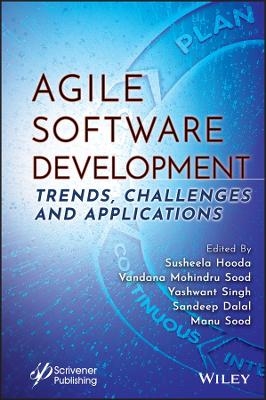
Agile Software Development
Wiley-Scrivener (Verlag)
978-1-119-89639-5 (ISBN)
Agile Software Development (ASD) has become a popular technology because its methods apply to any programming paradigm. It is important in the software development process because it emphasizes incremental delivery, team collaboration, continuous planning, and learning over delivering everything at once near the end. Agile has gained popularity as a result of its use of various frameworks, methods, and techniques to improve software quality. Scrum is a major agile framework that has been widely adopted by the software development community.
Metaheuristic techniques have been used in the agile software development process to improve software quality and reliability. These techniques not only improve quality and reliability but also test cases, resulting in cost-effective and time-effective software. However, many significant research challenges must be addressed to put such ASD capabilities into practice. With the use of diverse techniques, guiding principles, artificial intelligence, soft computing, and machine learning, this book seeks to study theoretical and technological research findings on all facets of ASD. Also, it sheds light on the latest trends, challenges, and applications in the area of ASD.
This book explores the theoretical as well as the technical research outcomes on all the aspects of Agile Software Development by using various methods, principles, artificial intelligence, soft computing, and machine learning.
Audience
The book is designed for computer scientists and software engineers both in research and industry. Graduate and postgraduate students will find the book accessible as well.
Susheela Hooda, PhD, is an assistant professor in the Department of Computer Science & Engineering, Chitkara University Institute of Engineering & Technology, Punjab, India. Vandana Mohindru Sood, PhD, is an assistant professor in the Department of Computer Science & Engineering, Chitkara University Institute of Engineering & Technology, Punjab, India. Yashwant Singh, PhD, is an associate professor & Head of the Department of Computer Science and Information Technology, Central University of Jammu, J&K, India. Sandeep Dalal, PhD, is an assistant professor in the Department of Computer Science & Applications, Maharshi Dayanand University, Rohtak, Haryana, India. Manu Sood, PhD. is a professor in the Department of Computer Science, Himachal Pradesh University, Shimla, India.
Preface Chapter 1 Agile Software Development in the Digital World – Trends and Challenges
Chapter 2 Agile Framework Adaptation Issues in Various Sectors
Chapter 3 Vulnerability Assessment Tools for IoT: An Agile Approach
Chapter 4 Interoperable Agile IoT
Chapter 5 Functional and Non-Functional Requirements in Agile Software Development
Chapter 6 Minimizing Cost, Effort, and Implementation Complexity for Adopting Security Requirements in an Agile Development Process for Cyber-Physical Systems
Chapter 7 A Systematic Literature Review on Test Case Prioritization Techniques
Chapter 8 A Systematic Review of the Tools and Techniques
Chapter 9 Distributed Agile Software Development (DASD) Process
Chapter 10 Task Allocation in Agile-Based Distributed Project Development Environment
Chapter 11 Software Quality Management by Agile Testing
Chapter 12 A Deep Drive into Software Development Agile Methodologies for Software Quality Assurance
Chapter 13 Factors and Techniques for Software Quality Assurance in Agile Software Development
Chapter 14 Classification of Risk Factors in Distributed Agile Software Development Based on User Story
Chapter 15 Software Effort Estimation with Machine Learning – A Systematic Literature Review
Chapter 16 Improving the Quality of Open Source Software
Chapter 17 Artificial Intelligence Enables Agile Software Development Life Cycle
Chapter 18 Machine Learning in ASD: An Intensive Study of Automated Disease Prediction Systems
Index
| Erscheinungsdatum | 06.03.2023 |
|---|---|
| Sprache | englisch |
| Gewicht | 785 g |
| Themenwelt | Informatik ► Theorie / Studium ► Künstliche Intelligenz / Robotik |
| Technik ► Elektrotechnik / Energietechnik | |
| ISBN-10 | 1-119-89639-8 / 1119896398 |
| ISBN-13 | 978-1-119-89639-5 / 9781119896395 |
| Zustand | Neuware |
| Informationen gemäß Produktsicherheitsverordnung (GPSR) | |
| Haben Sie eine Frage zum Produkt? |
aus dem Bereich


